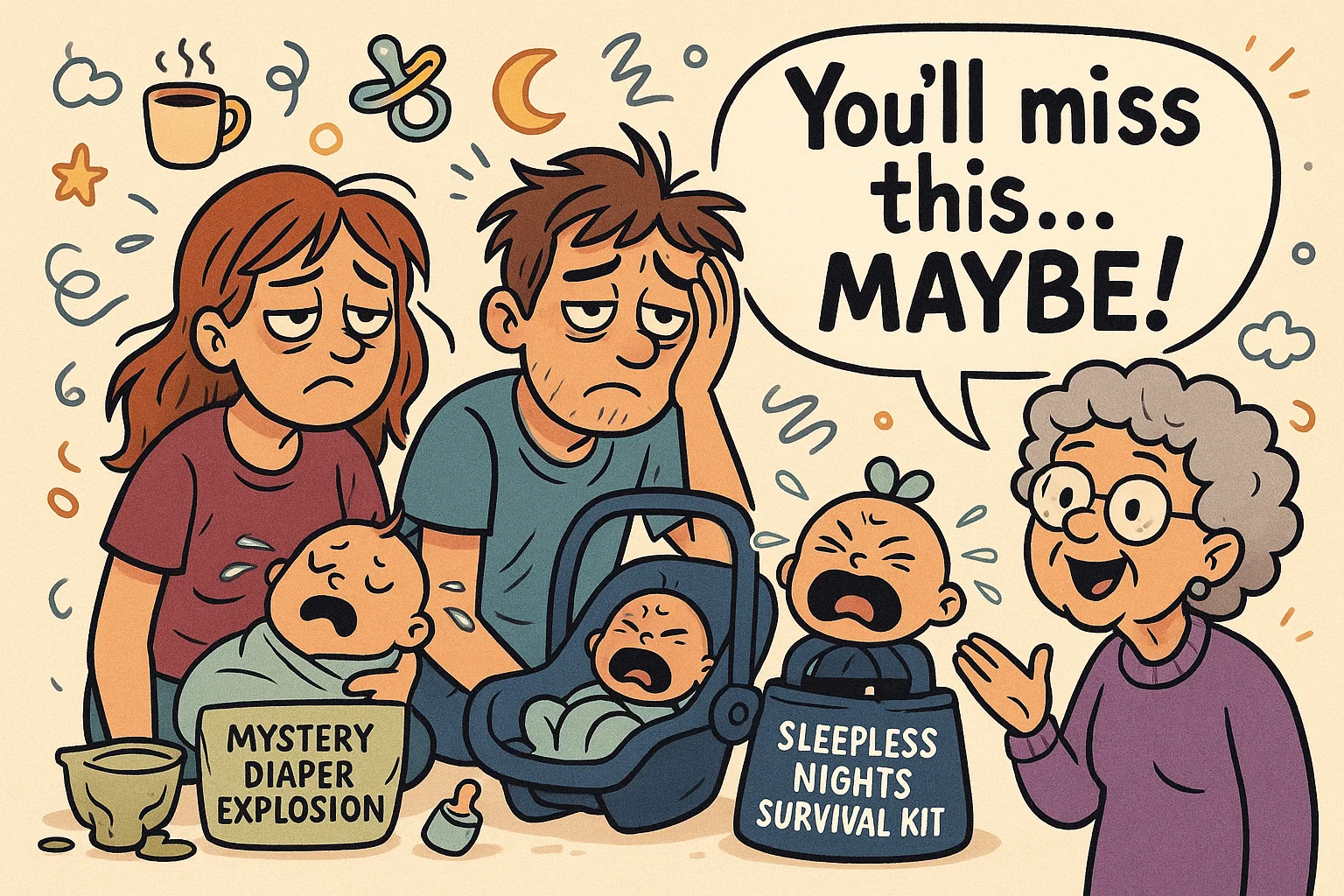Welcome to the wild, wonderful, and wonderfully chaotic world of new parenthood! If you’re reading this while bouncing a crying baby at 3 AM, covered in mysterious stains, and wondering what happened to your former life – congratulations, you’re doing it right.
Parenting advice comes at you from every direction when you’re expecting or have just welcomed your little bundle of joy. Some of it’s helpful, some of it’s outdated, and some of it clearly comes from people who’ve forgotten what it’s actually like to change explosive diapers while running on two hours of sleep. This guide cuts through the noise with hilarious parenting wisdom that’s both laugh-out-loud funny and genuinely useful.
First Time Parenting Expectations vs Reality
Let’s start with a reality check that every new parent needs to hear: your Pinterest-perfect parenting fantasies are about to meet their match in the form of one tiny, adorable, chaos-creating human.
What You Think Will Happen
Before the baby arrives, you have visions dancing in your head like sugar plums. You imagine peaceful moments where your sleeping baby rests angelically in their perfectly organized nursery. You picture yourself as a natural, glowing parent who instinctively knows exactly what your baby needs. The house stays reasonably clean, you maintain some semblance of a social life, and bonding with your newborn feels like a heartwarming montage from a family movie.
You plan elaborate photoshoots, imagine cooking healthy meals while baby naps, and maybe even think you’ll have time for that novel you’ve been meaning to read. Breastfeeding will be natural and beautiful, diaper changes will be quick and efficient, and bedtime routines will be blissfully calm affairs.
What Actually Happens
Reality hits like a freight train made of dirty diapers and sleepless nights. Your happy baby becomes a tiny dictator who operates on no discernible schedule. That beautiful nursery? It becomes ground zero for diaper explosions that defy the laws of physics. You’ll discover that baby poop has supernatural abilities to escape any diaper, no matter how well-secured.
According to a study published in the Journal of Sleep Research, new parents lose an average of 44 days of sleep in their baby’s first year. You’ll find yourself Googling “Is it normal for a baby to cry for three hours straight?” at 2 AM while wearing the same shirt you’ve had on for two days. The shower becomes a luxury experience you schedule like a business meeting, and eating hot food feels like winning the lottery.
Your conversations with other adults will revolve entirely around sleep schedules, feeding times, and the consistency of your baby’s latest diaper surprise. You’ll become fluent in deciphering different types of cries, though you’ll still guess wrong approximately 60% of the time.
Laughing at the Gap
Here’s the beautiful truth that experienced parents know: embracing the chaos and laughing at the gap between expectations and reality is half the battle. Those picture-perfect moments you imagined? They happen, just not when you expect them and usually when your phone is dead and you can’t capture them.
The sooner you accept that parenting is beautifully imperfect, the happier you’ll be. Every parent has felt overwhelmed, questioned their abilities, and wondered if they’re doing everything wrong. Spoiler alert: you’re not. You’re learning, adapting, and doing better than you think. The best piece of advice? Be adaptable and don’t apologize for figuring it out as you go.
Essential Survival Tips with a Funny Twist
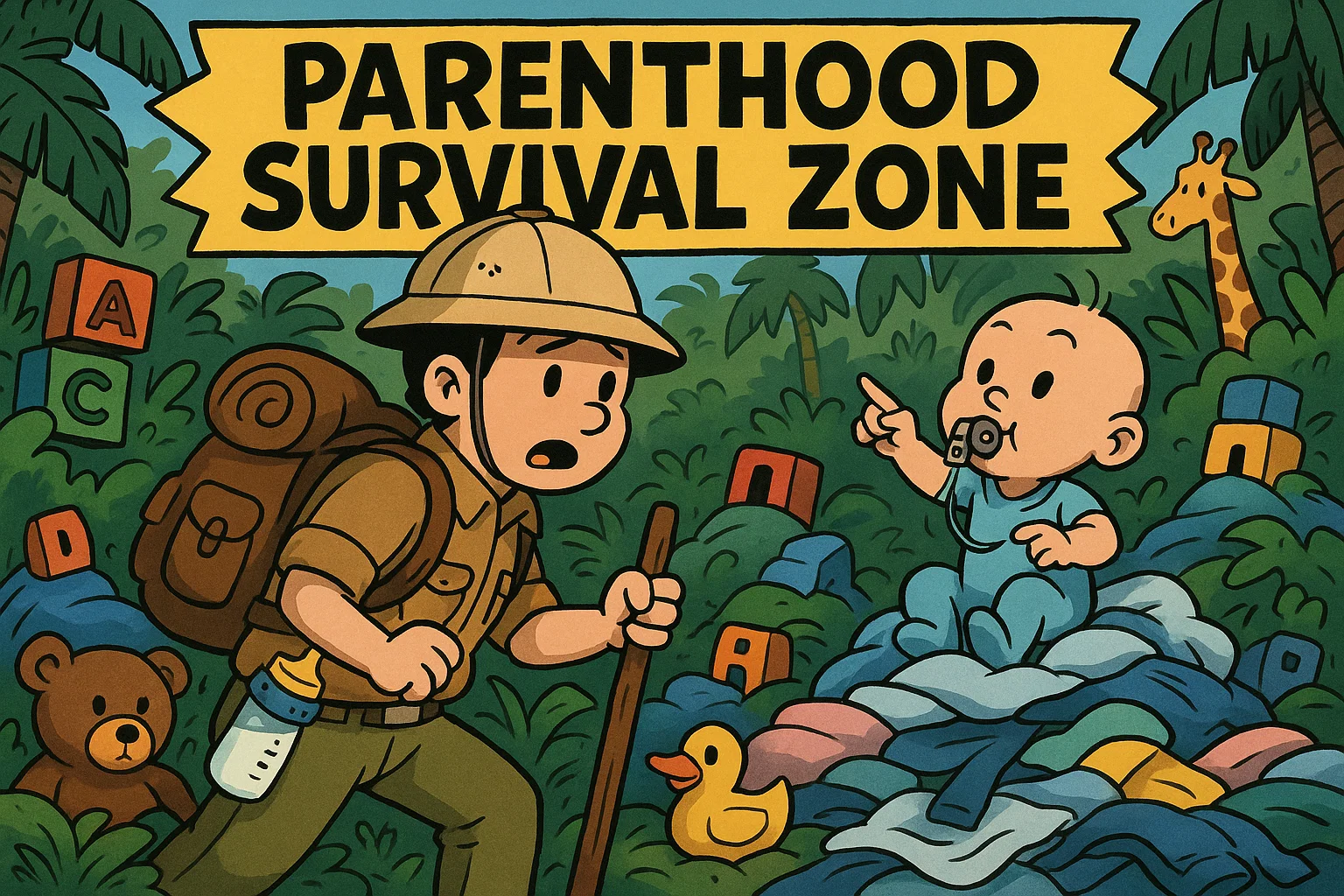
Let’s dive into some genuinely helpful tips for new parents, served with a healthy dose of humor to make the medicine go down easier.
Sleep While the Baby Sleeps… and Other Lies
This is probably the most well-meaning but utterly impractical baby advice ever given. Sure, in theory, it sounds perfect. Baby naps, you nap, everyone’s well-rested and happy. In reality, the baby sleeps for exactly 20 minutes – just long enough for you to start the dishwasher, attempt to use the bathroom, and contemplate whether those dishes in the sink have achieved sentience.
Instead of torturing yourself trying to nap on command, use those precious baby sleep moments strategically. Sometimes that means a quick shower (your first in three days). Sometimes it means eating something that doesn’t come in cracker form. And sometimes, it means just sitting in silence and remembering what quiet sounds like.
Pro tip: Lower your standards dramatically. A successful day might just be everyone staying alive and fed. That’s genuinely an accomplishment worth celebrating when you have a new baby.
Baby Poop Has Superpowers
Let’s talk about the elephant in the room – or rather, the explosive substance that will become a central topic of your daily conversations. Baby poop defies all known laws of physics and common sense. It will escape the most secure diaper, travel up your baby’s back to their hairline, and somehow end up on surfaces that shouldn’t be physically possible to reach.
Keep these emergency supplies within arm’s reach at all times: extra onesies (at least three), baby wipes (buy stock in the company), plastic bags for contaminated clothing, and a sense of humor. According to pediatric gastroenterologists, it’s completely normal for breastfed babies to have bowel movements after every feeding, while formula-fed babies might go several days between movements. Both scenarios can result in spectacular blowouts that will test your gag reflex.
You’ll Say the Weirdest Things
Parenthood will have you uttering phrases you never imagined would come out of your mouth. Your vocabulary will expand to include gems like:
- “Please don’t eat the dog’s food”
- “We don’t put socks in our mouth”
- “Is that poop or chocolate? Please let it be chocolate”
- “No, we can’t take the cat to daycare”
- “Stop trying to nurse on daddy”
These phrases will feel completely normal to you, even though pre-baby you would have questioned the sanity of anyone saying them.
Diapers: There’s No Such Thing as Too Many
Here’s some genuine parenting tips wrapped in humor: stockpile diapers like you’re preparing for the apocalypse. Your baby will go through approximately 10-12 diapers per day in the newborn stage, according to the American Academy of Pediatrics. That’s roughly 3,000 diapers in the first year alone.
You’ll have moments of panic when you reach for a diaper during a midnight change only to discover you’re down to your last one. This always happens at 2 AM when stores are closed and your baby has just produced what can only be described as a toxic waste situation requiring immediate attention.
Relationship Survival Guide for Sleep-Deprived Parents
Your relationship with your partner is about to be tested in ways you never imagined. Sleep deprivation, hormonal changes, and the stress of caring for a tiny human can strain even the strongest bonds. But with humor and communication, you can emerge stronger (and possibly more caffeinated).
Communicate with Grunts, Nods, and Eye Rolls
In the early days of parenthood, your communication skills will devolve to something resembling early human ancestors. Complete sentences become a luxury you can’t afford when operating on 90 minutes of sleep. You’ll develop an intricate system of non-verbal cues that somehow work perfectly for your situation.
A raised eyebrow means “your turn for diaper duty.” A gentle nudge at 3 AM translates to “baby’s crying and it’s definitely your turn.” An eye roll accompanied by a heavy sigh clearly communicates “please tell me you didn’t just wake the baby, I spent an hour getting to sleep.”
Research from the Gottman Institute shows that couples who maintain humor during stressful periods report higher relationship satisfaction. So laugh at your caveman communication – it’s temporary, and it’s actually kind of impressive how much you can convey without words.
Divide and Conquer… Sometimes Poorly
Splitting parenting duties sounds straightforward in theory. In practice, it often resembles a poorly coordinated dance where both people step on each other’s toes. You’ll develop systems like “I’ll take night feeds, you handle morning diapers,” which work great until your baby decides to have a growth spurt and wants to eat every hour for three days straight.
Create flexible systems rather than rigid rules. Some days one parent will carry more of the load, and that’s okay. The goal is long-term balance, not perfect daily scorekeeping.
Don’t Keep Score (Unless You’re Winning)
While we just said not to keep score, let’s be honest – everyone keeps a little mental tally, especially when sleep-deprived. “I got up with the baby three times last night” becomes ammunition in the ongoing negotiation of who deserves the next uninterrupted nap.
The key is acknowledging that you’re both doing your best with the resources you have. Some days your partner will be the superhero parent while you can barely remember where you put the baby wipes. Other days, you’ll be the one holding everything together while they have a meltdown over spilled formula.
Relationship survival tip: Institute a no-criticism policy between midnight and 6 AM. Everyone gets a pass for whatever happens during the witching hours. Those decisions made at 3 AM don’t count against anyone’s permanent record.
Unexpected Parenting Skills You’ll Learn
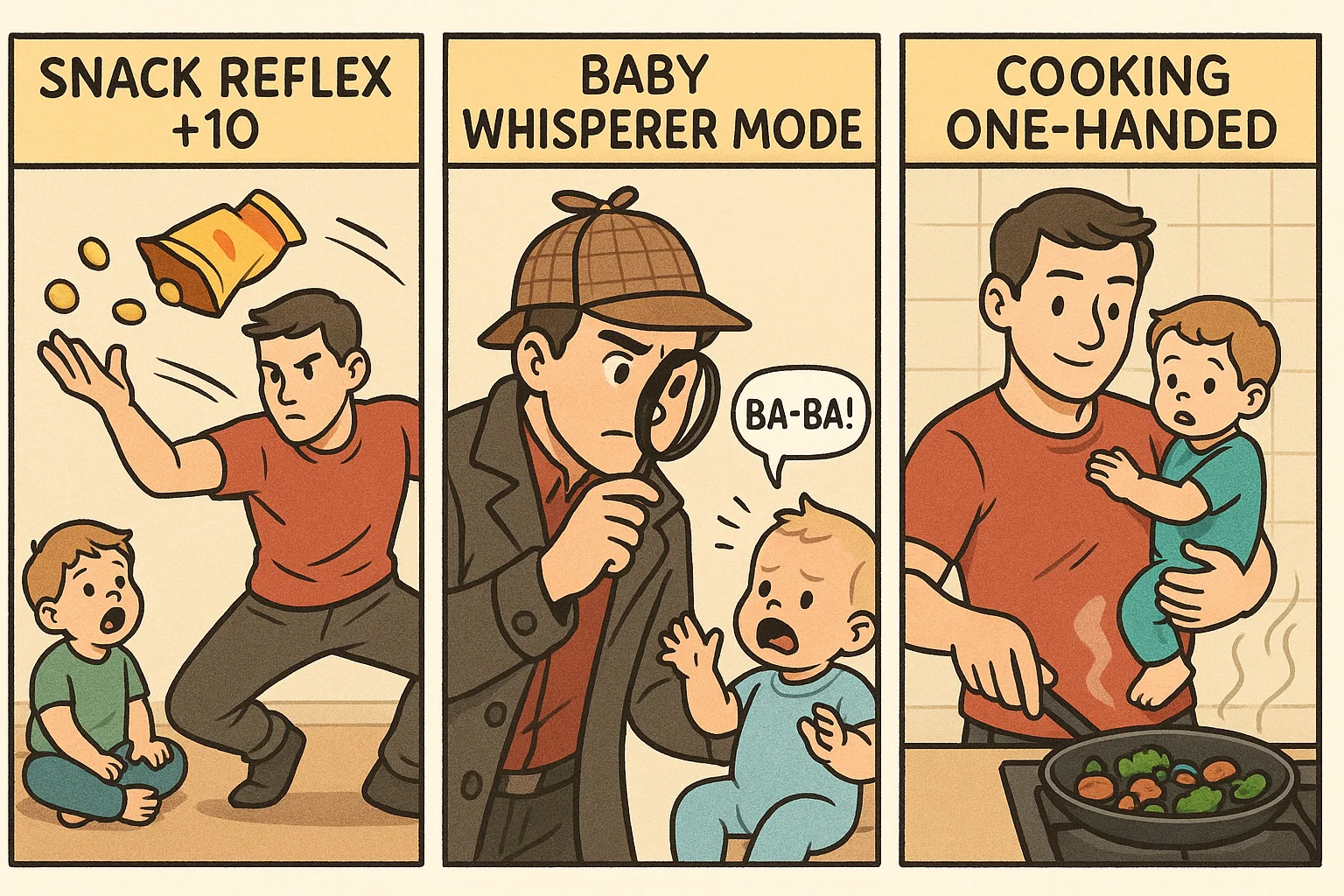
Parenthood will unlock abilities you didn’t know you possessed. You’ll develop ninja-like reflexes, supernatural hearing, and the ability to function on less sleep than you thought humanly possible.
Ninja Reflexes at 3 AM
Your reflexes will become lightning-fast when it comes to baby-related emergencies. You’ll catch falling pacifiers mid-air, dodge unexpected spit-up with matrix-like agility, and somehow manage to catch your phone, a diaper, and your sliding-off-the-couch baby all at the same time.
Sleep-deprived parents develop what researchers call “hypervigilance” – a heightened state of awareness that allows you to hear your baby’s breathing change from two rooms away. You’ll bolt upright at the slightest unusual sound, even when you’re dead tired.
Interpreting Baby Cries Like a Psychic
Every parenting book will tell you that you’ll learn to distinguish between your baby’s different cries. What they don’t tell you is that this process involves a lot of educated guessing and trial and error. You’ll become convinced you can hear the difference between “I’m hungry,” “I’m tired,” and “I just wanted to make sure you were still paying attention to me.”
The truth is, sometimes babies cry for reasons that remain mysterious to modern science. According to pediatric research, some babies have a “witching hour” (usually between 5-11 PM) when they cry inconsolably for no identifiable reason. It’s not you, it’s them. Really.
Mastering the Art of the One-Handed Meal
You’ll become amazingly adept at doing everything one-handed while holding a baby. Eating, typing, brushing your teeth, opening packages – all while maintaining perfect baby-holding form. Your non-dominant hand will become surprisingly skilled at complex tasks.
Cold food will become a regular part of your diet, not by choice but by necessity. You’ll reheat the same cup of coffee four times and still never actually drink it hot. Meals will be eaten standing up, in three-minute increments, whenever the baby allows it.
Dealing with Unsolicited Advice (Without Losing It)
Congratulations! Having a baby apparently makes you a magnet for advice from everyone – from your mother-in-law to the cashier at the grocery store. Some of it comes from genuine concern, some from outdated information, and some from people who seem to have forgotten what it’s actually like to have a newborn.
Smile, Nod, Ignore
Develop your poker face early. When someone tells you that babies should sleep through the night by six weeks (spoiler: many don’t), or that you’re spoiling your two-week-old by holding them too much, your best response is often a smile and a noncommittal “Hmm, interesting.”
Mental script: “Thank you for caring about us. We’re working with our pediatrician during our consultation visits to figure out what works best for our family.”
When to Actually Listen
Not all advice is created equal. Pay attention to suggestions from:
- Your pediatrician and healthcare providers
- Parents currently in the trenches with babies similar in age to yours
- Anyone offering practical help rather than criticism
- People who ask about your situation before offering solutions
Trust your instincts. If advice feels wrong for your family or contradicts medical guidelines, it’s okay to ignore it completely. You’re the expert on your own baby.
Best New Dad and Co-Parenting Laughs
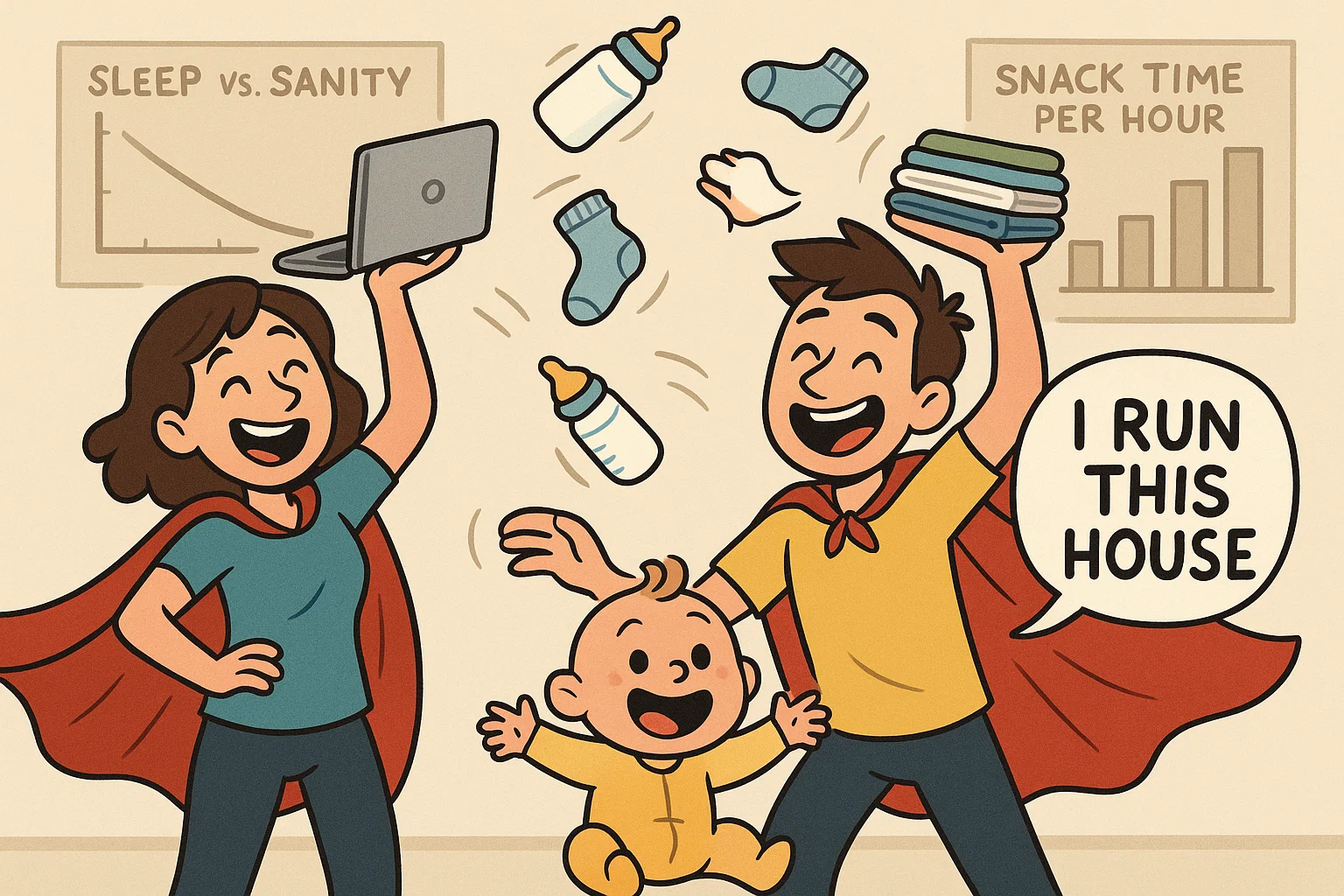
Let’s give some love to the non-birthing parents who are navigating their own unique challenges in this parenting adventure. Whether you’re a dad, partner, or co-parent, you’re dealing with your own set of hilarious and sometimes frustrating situations.
Diaper Duty Roulette
There’s an unspoken game that happens with diaper changes – who’s going to get the surprise blowout? It’s like Russian roulette, but with baby poop. You’ll approach each diaper change with cautious optimism, hoping this will be a routine situation rather than a hazmat emergency.
Dad pro tip: Keep a change of clothes for yourself in the diaper bag. Trust us on this one.
The Myth of “Helping Out”
Here’s a truth bomb for all parents: there’s no such thing as “helping out” with your own child. You’re not babysitting – you’re parenting. This mindset shift is crucial for creating truly equitable partnerships in child-rearing.
Both parents are learning on the job. Neither of you has magical parenting instincts that make you naturally better at certain tasks. The parent who gave birth doesn’t automatically know more about diaper changing or baby soothing – they’re just figuring it out too.
When It’s Just Too Much: Mental Health & Comic Relief
Let’s get real for a moment. The parenting experience with a newborn is intense, overwhelming, and sometimes downright scary. It’s normal to feel like you’re drowning some days, and it’s important to acknowledge those feelings while also finding ways to cope with humor and support.
It’s Okay to Cry Over a Dropped Spoon
Sleep deprivation and hormonal changes can make emotions feel disproportionate to the situation. You might find yourself sobbing over a dropped piece of toast or feeling overwhelmed by choosing which onesie to put on your baby. This is completely normal and temporary.
According to Postpartum Support International, up to 80% experience some form of baby blues, characterized by mood swings, crying spells, and feeling overwhelmed. These feelings typically resolve within two weeks after the baby is born.
Important note: If feelings of sadness, anxiety, or overwhelm persist beyond two weeks or interfere with daily functioning, don’t be afraid to ask for help from your healthcare provider. Postpartum depression and anxiety are treatable conditions, and getting support is a sign of strength, not weakness.
Laugh First, Clean Later
Some days your house will look like a hurricane hit it, and that’s okay. On hard days, prioritize your mental health and your family’s well-being over having a Pinterest-perfect home. That pile of laundry isn’t judging you, despite what it might feel like.
Find humor in the chaos when you can. Take photos of the ridiculous situations you find yourself in – your baby wearing three different outfits in one morning, the living room that looks like a diaper bag exploded, your partner asleep standing up while bouncing the baby.
You’re Not Alone (We’re All a Little Crazy Now)
The internet has given parents something precious – the knowledge that everyone else is struggling too. Parenting memes exist because they’re universally relatable. When you see other parents joking about hiding in the bathroom for five minutes of peace, you realize you’re not alone in your survival tactics.
Connect with other parents, whether online or in person. Parent groups, social media communities, and even casual conversations with other parents in the grocery store can provide much-needed validation and support. Don’t let burnout isolate you – accept help when it’s offered.
| Common New Parent Concerns | Reality Check |
| “My baby cries too much” | All babies cry. Average: 2-3 hours daily |
| “I’m not bonding fast enough” | Bonding can take weeks or months – it’s normal |
| “Other parents seem to have it figured out” | Everyone’s faking it to some degree |
| “I miss my old life” | Grieving your pre-baby life is healthy and normal |
Funny Wisdom from Real Parents
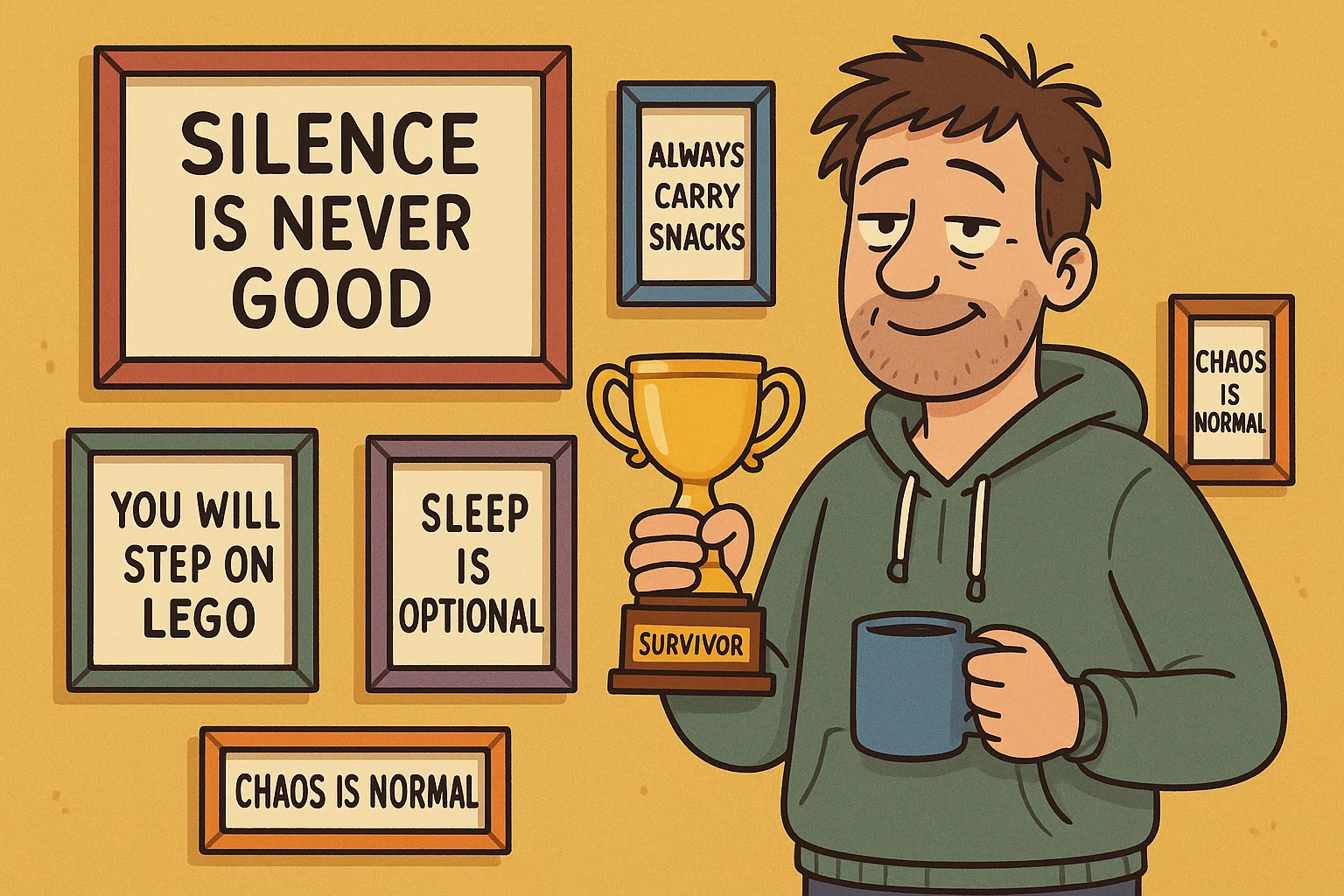
Sometimes the best advice comes from fellow parents who are right there in the trenches with you. Here are some genuine insights from real parents that perfectly capture the beautiful absurdity of those early parenting days.
“I Thought the Bouncer Was for Me”
Sarah, mom of twins: “I spent thirty minutes researching baby bouncers, reading reviews about which one would be best for my babies’ development. Then I brought it home, put it together, and realized I was the one who needed bouncing. Those first few weeks, I would have paid good money for an adult-sized bouncer to rock me to sleep.”
“We Used to Be Fun…”
Mark, dad of one: “My wife and I used to be the couple that stayed out until 2 AM at parties. Last Saturday night, we got excited because we managed to watch a 90-minute movie without pause. We felt like we’d conquered the world. Our idea of a wild night is now staying up past 10 PM and eating ice cream out of the container.”
“What I Wish I Knew (But Wouldn’t Have Believed Anyway)”
Jessica, mama of two: “Everyone told me to lower my expectations, but I thought they meant lower them a little bit. They meant lower them to approximately ground level. My biggest accomplishment some days is that everyone in the family is fed and relatively clean. And you know what? That’s actually pretty impressive.”
Essential Resources for Your Parenting Journey
When to Accept Help and Seek Support
Remember, you don’t need to be perfect in order to be the best parent for your baby. Here are essential parenting tips for knowing when to reach out:
- Accept help when family and friends offer specific assistance
- Schedule regular check-ins with your pediatrician beyond routine consultations
- Connect with other parents in your area or online communities
- Consider professional support if you’re experiencing signs of burnout
- Trust your toddler’s pediatrician for developmental concerns as they grow
Books That Made Me Laugh, Not Cry
Unlike those serious parenting tomes that make you feel like you need a PhD to raise a baby, these books will actually make you feel better about your parenting journey:
- “The Sh!t No One Tells You” series by Dawn Dais – Brutally honest and hilarious takes on pregnancy, newborns, and toddlers
- “Parenting: Illustrated with Crappy Pictures” by Amber Dusick – Visual humor that perfectly captures parenting absurdity
Final Wisdom for Bad Days
When you’re having one of those days where everything feels overwhelming, remember to:
- Cuddle your baby and yourself – physical comfort helps both of you
- Take breaks when you need them, even if it’s just five minutes in the bathroom
- Remember that every parent has bad days, and they don’t define your parenting abilities
- Be gentle with yourself during this massive life transition
Remember: Parenting is not a performance. It’s not about getting everything right or looking like you have it all figured out. It’s about showing up, doing your best with the energy and resources you have, and loving your baby through the beautiful, messy, hilarious journey of raising a tiny human.
The fact that you’re reading articles about parenting and caring enough to worry about doing it right means you’re already a good parent. Trust yourself, ask for help when you need it, and don’t forget to laugh at the absurdity of it all. Your baby doesn’t need perfect parents – they just need loving, caring ones who are willing to learn and grow alongside them.
Welcome to the adventure. It’s going to be wilder than you expect and more wonderful than you can imagine.


